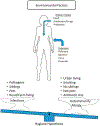Modulation of autoimmune arthritis by environmental 'hygiene' and commensal microbiota
- PMID: 30638679
- PMCID: PMC8056395
- DOI: 10.1016/j.cellimm.2018.12.005
Modulation of autoimmune arthritis by environmental 'hygiene' and commensal microbiota
Abstract
Observations in patients with autoimmune diseases and studies in animal models of autoimmunity have revealed that external environmental factors including exposure to microbes and the state of the host gut microbiota can influence susceptibility to autoimmunity and subsequent disease development. Mechanisms underlying these outcomes continue to be elucidated. These include deviation of the cytokine response and imbalance between pathogenic versus regulatory T cell subsets. Furthermore, specific commensal organisms are associated with enhanced severity of arthritis in susceptible individuals, while exposure to certain microbes or helminths can afford protection against this disease. In addition, the role of metabolites (e.g., short-chain fatty acids, tryptophan catabolites), produced either by the microbes themselves or from their action on dietary products, in modulation of arthritis is increasingly being realized. In this context, re-setting of the microbial dysbiosis in RA using prebiotics, probiotics, or fecal microbial transplant is emerging as a promising approach for the prevention and treatment of arthritis. It is hoped that advances in defining the interplay between gut microbiota, dietary products, and bioactive metabolites would help in the development of therapeutic regimen customized for the needs of individual patients in the near future.
Keywords: Arthritis; Aryl hydrocarbon receptor; Autoimmunity; Hygiene hypothesis; Indoles; Metabolites; Microbiome; Microbiota; Natural products; Prebiotics; Probiotics; Rheumatoid arthritis; Short-chain fatty acids; Th17/Treg balance; Tryptophan.
Copyright © 2018 Elsevier Inc. All rights reserved.
Conflict of interest statement
Declaration of interest
None.
Figures


Similar articles
-
Toll-like receptor mediated modulation of T cell response by commensal intestinal microbiota as a trigger for autoimmune arthritis.J Immunol Res. 2015;2015:527696. doi: 10.1155/2015/527696. Epub 2015 Feb 23. J Immunol Res. 2015. PMID: 25802876 Free PMC article. Review.
-
Integration of microbiome and epigenome to decipher the pathogenesis of autoimmune diseases.J Autoimmun. 2017 Sep;83:31-42. doi: 10.1016/j.jaut.2017.03.009. Epub 2017 Mar 23. J Autoimmun. 2017. PMID: 28342734 Review.
-
Partners in Leaky Gut Syndrome: Intestinal Dysbiosis and Autoimmunity.Front Immunol. 2021 Apr 22;12:673708. doi: 10.3389/fimmu.2021.673708. eCollection 2021. Front Immunol. 2021. PMID: 33968085 Free PMC article. Review.
-
Connecting the immune system, systemic chronic inflammation and the gut microbiome: The role of sex.J Autoimmun. 2018 Aug;92:12-34. doi: 10.1016/j.jaut.2018.05.008. Epub 2018 Jun 1. J Autoimmun. 2018. PMID: 29861127 Review.
-
Impacts of microbiome metabolites on immune regulation and autoimmunity.Immunology. 2018 Jun;154(2):230-238. doi: 10.1111/imm.12933. Epub 2018 Apr 30. Immunology. 2018. PMID: 29637999 Free PMC article. Review.
Cited by
-
Common innate pathways to autoimmune disease.Clin Immunol. 2020 Mar;212:108361. doi: 10.1016/j.clim.2020.108361. Epub 2020 Feb 10. Clin Immunol. 2020. PMID: 32058071 Free PMC article. Review.
-
Microbes are potential key players in the evolution of life histories and aging in Caenorhabditis elegans.Ecol Evol. 2023 Sep 25;13(9):e10537. doi: 10.1002/ece3.10537. eCollection 2023 Sep. Ecol Evol. 2023. PMID: 37753311 Free PMC article.
-
Anti-Aging Physiological Roles of Aryl Hydrocarbon Receptor and Its Dietary Regulators.Int J Mol Sci. 2020 Dec 31;22(1):374. doi: 10.3390/ijms22010374. Int J Mol Sci. 2020. PMID: 33396477 Free PMC article. Review.
-
Engineering live attenuated vaccines: Old dogs learning new tricks.J Transl Autoimmun. 2023 Mar 27;6:100198. doi: 10.1016/j.jtauto.2023.100198. eCollection 2023. J Transl Autoimmun. 2023. PMID: 37090898 Free PMC article. Review.
-
Possible Interactions between Malaria, Helminthiases and the Gut Microbiota: A Short Review.Microorganisms. 2022 Mar 27;10(4):721. doi: 10.3390/microorganisms10040721. Microorganisms. 2022. PMID: 35456772 Free PMC article. Review.
References
-
- Gibofsky A, Overview of epidemiology, pathophysiology, and diagnosis of rheumatoid arthritis, Am. J. Manag. Care 18 (13 Suppl) (2012) S295–S302. - PubMed
-
- Cross M, et al., The global burden of rheumatoid arthritis: estimates from the global burden of disease 2010 study, Ann. Rheum. Dis 73 (7) (2014) 1316–1322. - PubMed
-
- Alamanos Y, Drosos AA, Epidemiology of adult rheumatoid arthritis, Autoimmun. Rev 4 (3) (2005) 130–136. - PubMed
Publication types
MeSH terms
Grants and funding
LinkOut - more resources
Full Text Sources
Medical

